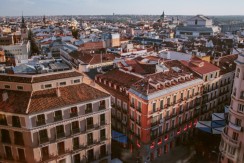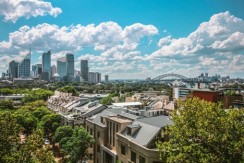Posted on 02/07/2010
By Nick Marr
Categories:
Brazil, five time winner of the FIFA World Cup and the world’s official top ranking team, is relishing the opportunity to host the World Cup tournament in 2014 - the event has not been held in Brazil since 1950. Preparations to host this mammoth event are well underway and it is hoped it will leave a lasting legacy in Brazil, a country for which football is a way of life.
ADIT Brasil, the government-funded association for inward investment in real estate and tourism www.aditnordeste.org.br says that all eyes will be on Brazil once the World Cup tournament ends in South Africa in July.
Felipe Cavalcante, ADIT Brasil’s President, says: “The 2014 World Cup will be a great opportunity for Brazil to showcase itself to the world.”
“It is anticipated that Brazil will spend $US 50 billion on various projects in the 12 host cities. In comparison, Germany needed to spend just $US 12 billion to prepare for the 2006 World Cup. So getting Brazil ready for the World Cup is a big project and huge challenge which we are looking forward to.”
Cavalcante continues: “The World Cup has given Brazil a focus for its projects and a fixed deadline. But I believe that Brazil’s economic growth and tourism and investment potential would be strong even if we weren’t hosting such a prestigious event. The 12 host cities are also the 12 major cities of Brazil so they would have naturally attracted investment and development.”
Many of ADIT Brasil’s members are working with international investors on projects which are expected to benefit from the World Cup effect. This includes infrastructure projects, agreements with hotel chains for expansion into host cities, retail and manufacturing projects. At its annual conference in May, over 120 foreign investors met with Brazilian companies to agree an anticipated R$ 1.8 billion of business.
FIFA rules state for the host nation that no more than one city may use two stadia and the number of host cities is limited to between eight and ten. Brazil appealed to FIFA and unusually it has been allowed to use twelve host cities, due to the sheer size of the country. These cities are: Belo Horizonte, Brasília, Cuiabá, Curitiba, Fortaleza, Manaus, Natal, Porto Alegre, Recife, Rio de Janeiro, Salvador and São Paulo.
Although it is widely anticipated that the final will be held in the existing Maracanã stadium in Rio which hosted the final back in 1950, many new stadia will need to be built and all of the existing ones will need to be upgraded to cope with additional capacity. New stadia will need to be built in Cuiabá, Manaus, Natal and Recife and the Fonte Nova stadium in Salvador is scheduled to be rebuilt.
The Brazilian Football Confederation estimates that the cost of construction and remodeling of stadia alone will be over $US 1.1 billion (approx. £550 million). Millions more is to be spent on required basic infrastructure. These projects include a high speed train connecting Campinas, São Paulo and Rio de Janeiro, likely to cost R$11 billion and a $US2.8 billion investment plan to upgrade airports of ten of the venue cities, increasing their capacity and the comfort of the hundreds of thousands of tourists expected for the Cup. Natal and Salvador are excluded from this fund because of their recent upgrade works and 55.3% of the money will be spent overhauling the airports of São Paulo and Rio de Janeiro. It is anticipated that 500,000 fans will come to Brazil for the tournament and that each fan could take between 6 and 14 flights to watch games in various cities.
Jeanine Pires of Brazil’s state tourism organisation Embratur says that Brazil plans to make the most of the World Cup to spread information on the country with a view to attracting more visitors. As the games will be played in a number of locations, Brazil will have the opportunity to showcase many of its major cities to tourists and property investors. Property ownership in Brazil has recently been triggered by plans for the development of a new international airport in the north (Greater Natal International Airport) which will be operational by 2014, boosting accessibility to Natal.
Luiz Barreto, the Brazilian minister of Tourism says, "Our target is to reach 2014 with sixty-five tourist destinations highly qualified to supply tourists and 10 million foreign visitors a year (currently Brazil receives 5 million per year).” A further study conducted by hotel consultancy specialists HVS Consulting & Valuation and Newmark Knight Frank predicts that over 7200 new units for second residences will be built in Brazil by 2014 as well as over 7600 new rooms in resorts and hotels.
Brazil, five time winner of the FIFA World Cup and the world’s official top ranking team, is relishing the opportunity to host the World Cup tournament in 2014 - the event has not been held in Brazil since 1950. Preparations to host this mammoth event are well underway and it is hoped it will leave a lasting legacy in Brazil, a country for which football is a way of life.
ADIT Brasil, the government-funded association for inward investment in real estate and tourism www.aditnordeste.org.br says that all eyes will be on Brazil once the World Cup tournament ends in South Africa in July.
Felipe Cavalcante, ADIT Brasil’s President, says: “The 2014 World Cup will be a great opportunity for Brazil to showcase itself to the world.”
“It is anticipated that Brazil will spend $US 50 billion on various projects in the 12 host cities. In comparison, Germany needed to spend just $US 12 billion to prepare for the 2006 World Cup. So getting Brazil ready for the World Cup is a big project and huge challenge which we are looking forward to.”
Cavalcante continues: “The World Cup has given Brazil a focus for its projects and a fixed deadline. But I believe that Brazil’s economic growth and tourism and investment potential would be strong even if we weren’t hosting such a prestigious event. The 12 host cities are also the 12 major cities of Brazil so they would have naturally attracted investment and development.”
Many of ADIT Brasil’s members are working with international investors on projects which are expected to benefit from the World Cup effect. This includes infrastructure projects, agreements with hotel chains for expansion into host cities, retail and manufacturing projects. At its annual conference in May, over 120 foreign investors met with Brazilian companies to agree an anticipated R$ 1.8 billion of business.
FIFA rules state for the host nation that no more than one city may use two stadia and the number of host cities is limited to between eight and ten. Brazil appealed to FIFA and unusually it has been allowed to use twelve host cities, due to the sheer size of the country. These cities are: Belo Horizonte, Brasília, Cuiabá, Curitiba, Fortaleza, Manaus, Natal, Porto Alegre, Recife, Rio de Janeiro, Salvador and São Paulo.
Although it is widely anticipated that the final will be held in the existing Maracanã stadium in Rio which hosted the final back in 1950, many new stadia will need to be built and all of the existing ones will need to be upgraded to cope with additional capacity. New stadia will need to be built in Cuiabá, Manaus, Natal and Recife and the Fonte Nova stadium in Salvador is scheduled to be rebuilt.
The Brazilian Football Confederation estimates that the cost of construction and remodeling of stadia alone will be over $US 1.1 billion (approx. £550 million). Millions more is to be spent on required basic infrastructure. These projects include a high speed train connecting Campinas, São Paulo and Rio de Janeiro, likely to cost R$11 billion and a $US2.8 billion investment plan to upgrade airports of ten of the venue cities, increasing their capacity and the comfort of the hundreds of thousands of tourists expected for the Cup. Natal and Salvador are excluded from this fund because of their recent upgrade works and 55.3% of the money will be spent overhauling the airports of São Paulo and Rio de Janeiro. It is anticipated that 500,000 fans will come to Brazil for the tournament and that each fan could take between 6 and 14 flights to watch games in various cities.
Jeanine Pires of Brazil’s state tourism organisation Embratur says that Brazil plans to make the most of the World Cup to spread information on the country with a view to attracting more visitors. As the games will be played in a number of locations, Brazil will have the opportunity to showcase many of its major cities to tourists and property investors. Property ownership in Brazil has recently been triggered by plans for the development of a new international airport in the north (Greater Natal International Airport) which will be operational by 2014, boosting accessibility to Natal.
Luiz Barreto, the Brazilian minister of Tourism says, "Our target is to reach 2014 with sixty-five tourist destinations highly qualified to supply tourists and 10 million foreign visitors a year (currently Brazil receives 5 million per year).” A further study conducted by hotel consultancy specialists HVS Consulting & Valuation and Newmark Knight Frank predicts that over 7200 new units for second residences will be built in Brazil by 2014 as well as over 7600 new rooms in resorts and hotels.
Brazil, five time winner of the FIFA World Cup and the world’s official top ranking team, is relishing the opportunity to host the World Cup tournament in 2014 - the event has not been held in Brazil since 1950. Preparations to host this mammoth event are well underway and it is hoped it will leave a lasting legacy in Brazil, a country for which football is a way of life.
ADIT Brasil, the government-funded association for inward investment in real estate and tourism www.aditnordeste.org.br says that all eyes will be on Brazil once the World Cup tournament ends in South Africa in July.
Felipe Cavalcante, ADIT Brasil’s President, says: “The 2014 World Cup will be a great opportunity for Brazil to showcase itself to the world.”
“It is anticipated that Brazil will spend $US 50 billion on various projects in the 12 host cities. In comparison, Germany needed to spend just $US 12 billion to prepare for the 2006 World Cup. So getting Brazil ready for the World Cup is a big project and huge challenge which we are looking forward to.”
Cavalcante continues: “The World Cup has given Brazil a focus for its projects and a fixed deadline. But I believe that Brazil’s economic growth and tourism and investment potential would be strong even if we weren’t hosting such a prestigious event. The 12 host cities are also the 12 major cities of Brazil so they would have naturally attracted investment and development.”
Many of ADIT Brasil’s members are working with international investors on projects which are expected to benefit from the World Cup effect. This includes infrastructure projects, agreements with hotel chains for expansion into host cities, retail and manufacturing projects. At its annual conference in May, over 120 foreign investors met with Brazilian companies to agree an anticipated R$ 1.8 billion of business.
FIFA rules state for the host nation that no more than one city may use two stadia and the number of host cities is limited to between eight and ten. Brazil appealed to FIFA and unusually it has been allowed to use twelve host cities, due to the sheer size of the country. These cities are: Belo Horizonte, Brasília, Cuiabá, Curitiba, Fortaleza, Manaus, Natal, Porto Alegre, Recife, Rio de Janeiro, Salvador and São Paulo.
Although it is widely anticipated that the final will be held in the existing Maracanã stadium in Rio which hosted the final back in 1950, many new stadia will need to be built and all of the existing ones will need to be upgraded to cope with additional capacity. New stadia will need to be built in Cuiabá, Manaus, Natal and Recife and the Fonte Nova stadium in Salvador is scheduled to be rebuilt.
The Brazilian Football Confederation estimates that the cost of construction and remodeling of stadia alone will be over $US 1.1 billion (approx. £550 million). Millions more is to be spent on required basic infrastructure. These projects include a high speed train connecting Campinas, São Paulo and Rio de Janeiro, likely to cost R$11 billion and a $US2.8 billion investment plan to upgrade airports of ten of the venue cities, increasing their capacity and the comfort of the hundreds of thousands of tourists expected for the Cup. Natal and Salvador are excluded from this fund because of their recent upgrade works and 55.3% of the money will be spent overhauling the airports of São Paulo and Rio de Janeiro. It is anticipated that 500,000 fans will come to Brazil for the tournament and that each fan could take between 6 and 14 flights to watch games in various cities.
Jeanine Pires of Brazil’s state tourism organisation Embratur says that Brazil plans to make the most of the World Cup to spread information on the country with a view to attracting more visitors. As the games will be played in a number of locations, Brazil will have the opportunity to showcase many of its major cities to tourists and property investors. Property ownership in Brazil has recently been triggered by plans for the development of a new international airport in the north (Greater Natal International Airport) which will be operational by 2014, boosting accessibility to Natal.
Luiz Barreto, the Brazilian minister of Tourism says, "Our target is to reach 2014 with sixty-five tourist destinations highly qualified to supply tourists and 10 million foreign visitors a year (currently Brazil receives 5 million per year).” A further study conducted by hotel consultancy specialists HVS Consulting & Valuation and Newmark Knight Frank predicts that over 7200 new units for second residences will be built in Brazil by 2014 as well as over 7600 new rooms in resorts and hotels.
Buy Find Sell Property in Brazil
Are you looking to buy property in Brazil ? Ceara
, Sao Paulo
, Ilha De Itamaracá
, Florianópolis
, Rio De Janeiro
Are you looking to rent property in Brazil ? Bahia
, Belo Horizonte
, Japaratinga






Author
Nick Marr
I am an internet entrepreneur with a passion for driving big audiences and a love for real estate. I have had plenty of ups and downs which has given me the experience to help others launch their own businesses. I enjoy projects that save consumers time and money, challenge convention and add real value to peoples lives.